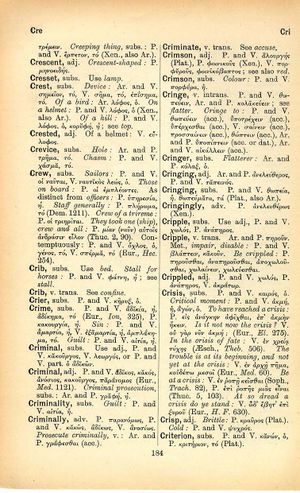crisis
Τί ὕπνος; Καμάτων ἀνάπαυσις, ἰατρῶν κατόρθωμα, δεδεμένων λύσις, ἀγρυπνούντων σοφία, νοσούντων εὐχή, θανάτου εἰκών, ταλαιπωρούντων ἐπιθυμία, πάσης πνοῆς ἡσυχία, πλουσίων ἐπιτήδευμα, πενήτων ἀδολεσχία, καθημερινὴ μελέτη. → What is sleep? Rest from toil, the success of physicians, the release of those who are bound, the wisdom of the wakeful, what sick men pray for, an image of death, the desire of those who toil in hardship, the rest of all the spirit, a principal occupation of the rich, the idle chatter of poor men, a daily object of concern.
English > Greek (Woodhouse)
subs.
P. and V. καιρός, ὁ.
Critical moment: P. and V. ἀκμή, ἡ, ἀγών, ὁ.
To have reached a crisis: P. εἰς ἀνάγκην ἀφῖχθαι, ἐπʼ ἀκμὴν ἥκειν.
Is it not now the crisis? V. οὐ γὰρ νῦν ἀκμή; (Eur., El. 275).
In the crisis of fate: V. ἐν χρείᾳ τύχης (Aesch., Theb. 506).
The trouble is at its beginning, and not yet at the crisis: V. ἐν ἀρχῇ πῆμα, κοὐδέπω μεσοῖ (Eur., Med. 60).
Be at a crisis: V. ἐν ῥοπῇ κεῖσθαι (Soph., Trach. 82), P. ἐπὶ ῥοπῆς μιᾶς εἶναι (Thuc. 5, I03).
At so dread a crisis do ye stand: V. ὦδʼ ἔβητʼ ἐπὶ ξυροῦ (Eur., H.F. 630).
Latin > English (Lewis & Short)
crĭsis: is, f., = κρίσις>, medic. t. t.,
I a decision, crisis, Sen. Ep. 83, 4.

